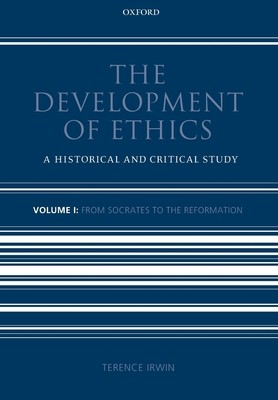
- We will send in 10–14 business days.
- Author: Terence Irwin
- Publisher: Oxford University Press, USA
- ISBN-10: 0199693854
- ISBN-13: 9780199693856
- Format: 17 x 24.4 x 4.1 cm, softcover
- Language: English
- SAVE -10% with code: EXTRA
Reviews
Description
The Development of Ethics is a selective historical and critical study of moral philosophy in the Socratic tradition, with special attention to Aristotelian naturalism, its formation, elaboration, criticism, and defence. It discusses the main topics of moral philosophy as they have developed historically, including: the human good, human nature, justice, friendship, and morality; the methods of moral inquiry; the virtues and their connexions; will, freedom, and responsibility; reason and emotion; relativism, subjectivism, and realism; the theological aspect of morality. This volume examines ancient and medieval philosophy up to the sixteenth century; Volumes 2 and 3 will continue the story up to Rawls's Theory of Justice. The present volume begins with Socrates, the Cyrenaics and Cynics, and Plato, and then offers a fuller account of Aristotle, stressing the systematic naturalism of his position. The Stoic position is compared with the Aristotelian at some length; Epicureans and Sceptics are discussed more briefly. Chapters on early Christianity and on Augustine introduce a fuller examination of Aquinas' revision, elaboration, and defence of Aristotelian naturalism. The volume closes with an account of some criticisms of the Aristotelian outlook by Scotus, Ockham, Machiavelli, and some sixteenth-century Reformers. The emphasis of the book is not purely descriptive, narrative, or exegetical, but also philosophical. Irwin discusses the comparative merits of different views, the difficulties that they raise, and how some of the difficulties might be resolved. The book tries to present the leading moral philosophers of the past as participants in a rational discussion that is still being carried on, and tries to help the reader to participate in this discussion.EXTRA 10 % discount with code: EXTRA
The promotion ends in 14d.15:05:25
The discount code is valid when purchasing from 10 €. Discounts do not stack.
- Author: Terence Irwin
- Publisher: Oxford University Press, USA
- ISBN-10: 0199693854
- ISBN-13: 9780199693856
- Format: 17 x 24.4 x 4.1 cm, softcover
- Language: English English


Reviews